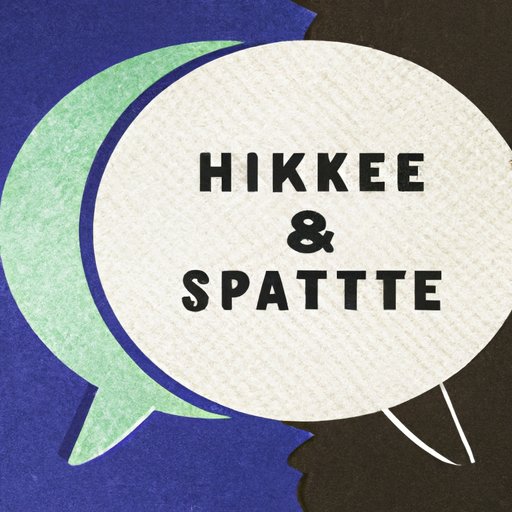
Introduction
When it comes to our rights as Americans, few are as fundamental as the right to free speech guaranteed by the First Amendment. Understanding this fundamental right is crucial for anyone who wants to make informed decisions about their own personal freedoms and the way that they participate in American democracy.
In this article, we will explore the intricacies of the First Amendment and dive into the concept of free speech. From the historical context of this fundamental right to its modern applications, we will help you understand the importance of free speech and how it has shaped America.
Understanding the First Amendment: What You Need to Know About Free Speech
The text of the First Amendment reads as follows:
“Congress shall make no law respecting an establishment of religion, or prohibiting the free exercise thereof; or abridging the freedom of speech, or of the press; or the right of the people peaceably to assemble, and to petition the Government for a redress of grievances.”
This amendment was included in the Bill of Rights and is intended to protect the civil liberties of American citizens. Most notably, it protects the fundamental right to free speech, which has long been considered one of the most crucial aspects of American democracy.
However, free speech is not an absolute right. While the First Amendment protects individuals’ right to express themselves, it also has limitations. These restrictions are in place to protect public safety and the rights of others, but there is sometimes tension between these principles and the right to free speech.
For example, yelling “fire” in a crowded theater when there is no emergency is not protected free speech since doing so could inspire panic and endanger others. There are other types of speech that are similarly not protected by the First Amendment, which we’ll explore in the next section.
The Legal Limits to Free Speech: The Boundaries of the First Amendment
While the First Amendment protects free speech, there are exceptions to this general rule. These exceptions are designed to protect public safety, national security, and individual rights. Some types of speech that may be regulated or restricted include:
- Obscenity
- Defamation
- Incitement to violence or lawbreaking
- Speech that infringes on intellectual property rights
- Child pornography
In addition to these examples, there is the “clear and present danger” test designed to regulate speech that could inspire imminent violence. The test was created by the Supreme Court in Schenck v. United States and has been used in various subsequent cases to determine whether speech may be restricted.
Despite these limitations, the First Amendment protects a wide variety of speech, including political speech, artistic expression, and even hate speech, which triggers lots of controversy.
The Importance of Free Speech in a Democracy: How the First Amendment Safeguards Our Freedoms
The right to free speech is crucial to democracy. Without this right, citizens would not have the ability to express themselves and engage in debates on issues of public interest. Furthermore, free speech plays a crucial role in holding public officials accountable.
This is perhaps best exemplified by the role that the press plays in American democracy. Journalists have the right to cover stories without censorship from the government, which enables them to shine a light on issues that might otherwise remain hidden. They can call attention to wrongdoing and corruption, holding those in power accountable for their actions.
Beyond that, the First Amendment enables citizens to express their views on issues of public importance without fear of retaliation or censorship. This makes it possible for a wide range of voices to be heard within our society, including minorities whose opinions might be suppressed in other types of political systems.
First Amendment Freedoms: How Free Speech Shapes American Society
The right to free speech has had a profound impact on American culture and society. Over the years, free speech has been used to create positive change on issues ranging from civil rights to women’s rights.
For example, free speech has been crucial in the women’s rights movement. Feminist pioneers such as Betty Friedan, Gloria Steinem, and Audre Lorde used the power of words to fight for gender equality. They wrote books, gave speeches, and organized rallies to call attention to the ways that women were being treated unfairly in American society.
More recently, free speech has played a central role in the Black Lives Matter movement. Activists have used speech, from social media to physical protests, to call attention to police brutality and racial injustice in the United States. These speeches and protests have led to legislative change, cultural shifts, and widespread protests.
A History of Free Speech in America: From the Founding Fathers to the Digital Age
The legal interpretation of free speech has changed dramatically over the years. At the time of our founding as a nation, the First Amendment was intended to protect political speech, particularly the speech of those who were criticizing the government. During the Cold War, the focus shifted, with the government often focusing on restricting speech that they felt might threaten national security.
With the rise of the internet, there have been new challenges to free speech. Social media sites like Facebook, Twitter, and YouTube are now playing a central role in the debates about free speech. Their algorithms and policies have led to widespread concern that they are censoring speech, or allowing dangerous content to spread unchecked.

The First Amendment and Hate Speech: When Free Speech Conflicts with Equality
One of the most challenging issues when it comes to free speech is hate speech. There is tension between protecting the right to free speech and preventing speech that promotes hatred or violence against certain individuals or groups.
The Supreme Court has found that hate speech is a form of protected speech unless it fits into one of the categories of speech that are not protected by the First Amendment discussed previously. While many people find hate speech to be abhorrent, regulating it is often seen as problematic because the Supreme Court has interpreted the First Amendment to protect nearly all forms of speech.
Even so, some states have proposed or passed laws that seek to regulate hate speech, specifically on college campuses. The idea behind these laws is to prevent hate speech from creating an unsafe environment on campus and to promote equality. But this has led to a range of controversies and debates.
Protecting Free Speech: Challenges and Controversies in the First Amendment
The right to free speech continues to be a subject of debate and controversy in contemporary society. Social media, in particular, has raised many questions about free speech.
For example, free speech debates on college campuses have become increasingly contentious, often revolving around concerns over hate speech, free speech zones, and cancel culture. Similarly, social media sites have faced criticism over their perceived biases, especially when they appear to be censoring speech from one political affiliation over another.
Conclusion
The right to free speech is a cornerstone of American democracy that has had a profound impact on our history, culture, and society. Understanding the nuances of the First Amendment is critical for all citizens who want to be active and informed participants in American democracy.
Whether you are a student trying to navigate free speech debates on campus, or an activist working to affect social change, understanding the importance of the First Amendment is essential. So exercise your right to free speech, and use your voice to make a difference.




